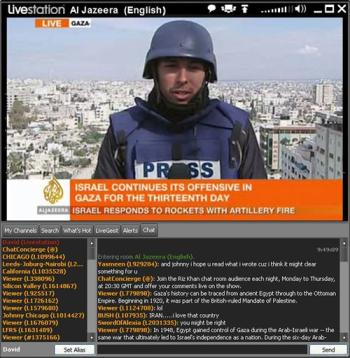Yesterday a group of students from Northwestern University joined a worldwide huger strike in support of the Roxana Saberi, an American journalist imprisoned in Iran for espionage.
 Saberi’s plight has brought world-wide condemnation of the Iranian government, after she was sentenced to eight years in prison in a closed trial that lasted only one hour. A reported 225 people have signed up to the “Free Roxana” campaign, after the Northwestern graduate started her own hunger strike in protest on April 21.
Saberi’s plight has brought world-wide condemnation of the Iranian government, after she was sentenced to eight years in prison in a closed trial that lasted only one hour. A reported 225 people have signed up to the “Free Roxana” campaign, after the Northwestern graduate started her own hunger strike in protest on April 21.
“The main point is to create awareness about the situation Roxana is facing and what many people are facing in Iran,” said student David Caratelli.
Saberi’s story is the latest example of how journalists around the globe are being persecuted for their profession. Fittingly, yesterday also marked World Press Freedom Day, instituted in 1997 by the United Nations General Assembly to raise awareness of the importance of freedom of the press as enshrined under Article 19 of the Universal Declaration of Human Rights.
In the past year, 60 journalists and media workers have been killed, 29 kidnapped and more than 900 attacked around the world. “Journalists been killed while trying to lift the veil of secrecy that governments seek to wrap around their military actions”, said Jeremy Dear, general secretary of the National Union of Journalists.
Speaking at a debate at London’s Frontline Club on Friday, he argued against the motion “Governments at war are winning the battle of controlling the international media”.
“The war on terror has been accompanied by a war just civil liberties and independent journalism,” he said, citing numerous instances of journalists in Iraq and Afghanistan facing persecution. But despite the actions of repressive governments the world over, he argued that “the voices of those suffering are given life by journalists”.
Yet his point was hotly contested. Andrew Gilligan, the controversial Evening Standard columnist, argued against the motion, claiming that war correspondents today are so desperate for stories that they latch on to anything that they would normally dismiss as rumour or government spin.
He said: “The real problem for reporting on combat situations and the reason that so many stories from Iraq were wrong is simply this: wars create a sellers market in news”. Citing the practice of embedding journalists with troops in combat situations, he said that war creates a “sellers market” for news where journalists routinely succumb to a pervasive form of self-censorship.
“Even the most independent-minded journalist in the world is not disposed to write unkind things about somebody in that situation. No one needs to threaten or be threatened,” he said.
His co-speaker James Shea, Director of Policy Planning in the Private Office of the Secretary General NATO, also countered the argument that web 2.0 technology is undermining government control of information.
“These days, everybody can be a reporter on reality”
“And if the profession has been democratised, why can’t the government also therefore enter the profession as a reporter on its own activity?”
He cited new NATO TV channels and the use of articles by eminent ‘experts’ in papers as examples of how the government is bypassing the media to get its message across and winning the war of words that has grown out of the war on terror.
Yet the most compelling of all the speakers was and Alan Fisher, a London correspondent from Al Jazeera who has reported from  war zones around the world, most recently during Georgia’s war with Russia in August of last year.
war zones around the world, most recently during Georgia’s war with Russia in August of last year.
Descrying the debate’s Western-centric view on the success of the media, he said:
“People tend to think that if a tree falls in the forest, and an American broadcast network isn’t there to record it, did it really fall?”
Discussing the coverage of the war in Gaza, which prompted the theme of the debate, he said that Al Jazeera had been the only channel able to give full coverage of the bombings because it was prepared to tap the vast resources of local journalists already living on the strip, unlike many outlets which relied almost exclusively on Israeli news reports.
He also argued that the proliferation of international news outlets meant there are “more ways of accessing the truth” that ever before, creating a more varied and exciting perspective on international events. He said:
“We challenge authority more than ever before an we continue to and that is why the government cannot win.”
 The group urged members to strike, wear black, and write “No” to Mubarak on their money.
The group urged members to strike, wear black, and write “No” to Mubarak on their money. Fattah is not alone. Others, such as Noha Atef, who runs the
Fattah is not alone. Others, such as Noha Atef, who runs the  A Home Office
A Home Office
Recent Comments